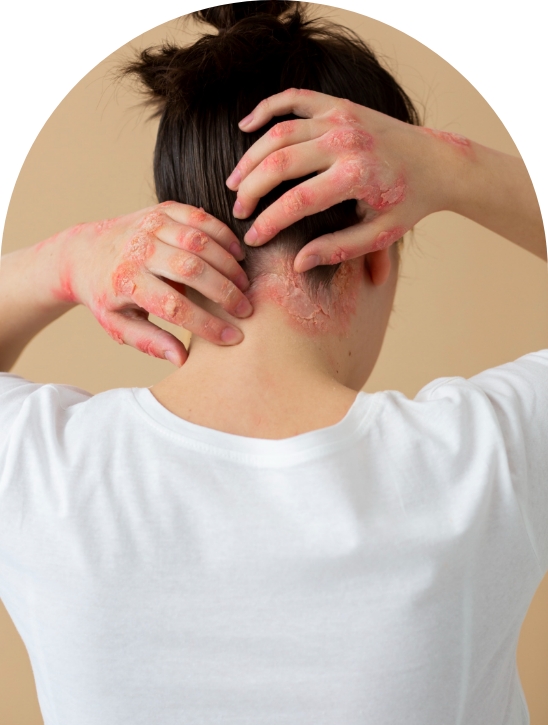Fungus Infections Testing
Fungus Infection Test at Bloom Clinic

Fungal Infection - Overview
Fungal infections are also referred to as mycoses. They are caused by single or multi-cellular organisms affecting skin, hair, and nails. They can be true pathogens for healthy people or opportunistic pathogens for immune-compromised ones, potentially leading to serious diseases.
Signs of Fungal Infections
Common signs of fungal infections include redness, itching, scaling, and peeling of the skin. Other symptoms may include burning, swelling, and the appearance of raised, circular patches with defined borders.
Over-the-Counter Antifungal Creams
For fungal infections, over-the-counter antifungal cream like 1% clotrimazole and 1% terbinafine are effective. If these fail, prescription options like econazole 1% or oral terbinafine may be necessary. However, always consult with the doctor first as they will prescribe the best antifungal cream.
Preventative Measures
Prevent fungal skin infections by keeping clothes dry and clean, wearing loose-fitting attire, avoiding sharing personal items, rotating shoes to prevent athlete’s foot, and choosing breathable fabrics like cotton.
Cause of Fungal Infections
- Corticosteroids: Lower immune responses, promoting fungal growth.
- Medical Conditions: Diabetes and certain cancers increase susceptibility.
- Compromised Immune System: Chemotherapy or AIDS weakens immunity, fostering fungal infections.
- Environmental Factors: Moist environments favour fungal growth.
- Antibiotics: Reduce helpful bacteria, allowing fungi to invade.
- Heredity: Genetic predisposition increases vulnerability to fungal infections.
Start your journey
Get an online consultation or visit our clinics.
Call us now
+971 (0) 45656070
Clinic Address
R23 France Cluster, International City, Dubai
Have a question?
Speak with Our Expert Clinicians!
Fungus Testing Phase
During the fungus testing phase, samples are collected and analyzed to identify fungal pathogens. Various diagnostic methods such as microscopy and culture may be used to determine the presence and type of fungus.
Types of Fungal Infections
- Tinea Pedis ("Athlete's Foot")
- - Affects over 10% annually
- - 75% lifetime occurrence
- - Fungus between toes, moist, easily rubbed off
- - Red, dry, flaky tops
- - Hot, moist conditions or no socks
- Tinea Cruris ("Jock Itch")
- - Moist, sweaty groin
- - Intense itching, burning
- - Redness, flaking, peeling
- Tinea Corpora (Ringworm)
- - Microscopic fungus, red ring
- - Itchy, flaky inside
- - Can spread
- Candidiasis
- - Brown-red, itchy
- - Skin folds
- - Causes vaginal infections
Get Rid of Fungal Infections Today!
Schedule your fungal testing at Bloom Plus Poly Clinic today for precise diagnosis and prompt delivery of test results so that you can timely start your treatment. Your skin’s health matters.
Frequently Asked Questions
The most effective Fungus infections treatment often includes antifungal medications, such as creams, ointments, or oral tablets, prescribed by a healthcare professional based on the type and severity of the infection.
Permanently treating fungus usually involves a combination of antifungal medications, maintaining good hygiene practices, keeping affected areas dry, and addressing underlying health conditions that may contribute to fungal growth.
Dermatologists are specialised doctors who commonly treat fungal infections. They have expertise in diagnosing and managing various skin conditions, including fungal infections, through accurate diagnosis and personalised treatment plans.
The best way to get rid of a fungal infection is by following the prescribed treatment regimen, which may include antifungal medications, keeping the affected area clean and dry, avoiding sharing personal items, and addressing any underlying health issues. Prompt medical attention is crucial for effective treatment.
Common risk factors for fungal infections include weakened immune systems, warm and humid environments, poor hygiene, use of antibiotics or corticosteroids, diabetes, obesity, and contact with infected individuals or contaminated surfaces.
Yes, fungal infections can often be prevented by practising good hygiene, keeping skin clean and dry, avoiding sharing personal items, wearing clean and breathable clothing, using antifungal powders or sprays in susceptible areas, and maintaining a healthy lifestyle to support immune function.
